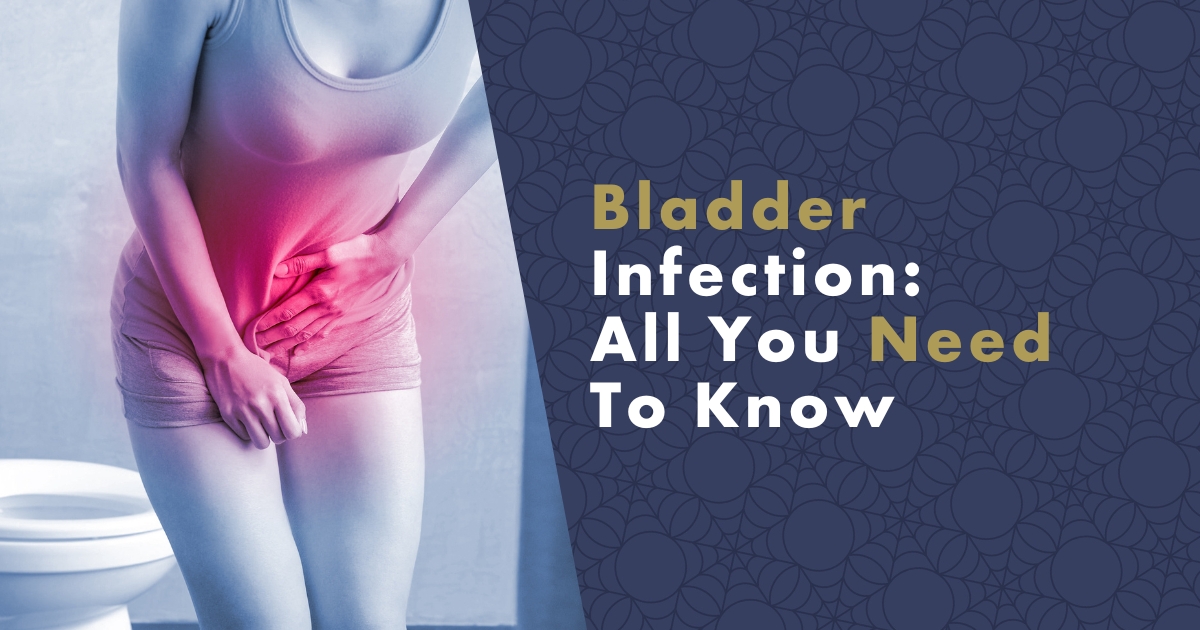Bladder infections, also known as urinary tract infections (UTIs), can significantly impact one's daily life due to discomfort and inconvenience. Understanding the symptoms and causes of bladder infections is crucial for early detection and effective management. In this article, we will delve into the common signs and underlying factors associated with bladder infections. Additionally, we'll explore a promising dietary supplement, D-Mannose, and other supplements that may play a role in supporting bladder health. Discovering how to identify a bladder infection and incorporating dietary supplements into your routine could be key elements in managing and preventing these bothersome infections.

Bladder infections are unmistakable and impossible to ignore. They often result in frequent trips to the bathroom accompanied by a persistent urge to urinate. Additionally, you may experience a burning or stinging sensation when you do go.
#produkty#https://www.nanospace.store/uro-help-forte-mce/
Bladder infections cause cystitis, which is an inflammation and irritation of the bladder, leading to these symptoms. It is the most common type of urinary tract infection (UTI).
Your urinary tract is comprised of the following components:
- Your kidneys, which remove waste from your bloodstream and produce urine.
- The ureters, which are slender tubes (one for each kidney) that transport urine to your bladder.
- The bladder, which acts as a storage tank for urine.
- The urethra, which carries urine from the bladder out of your body.
Women are more prone to bladder infections than men, but with proper treatment, such as antibiotics, these infections are typically only a nuisance and not serious. However, if left untreated, bladder infections can spread to the kidneys through the ureters, causing more serious issues, so it is essential to treat them promptly.
Understanding the Difference: Cystitis vs. Urinary Tract Inflammation
Cystitis, or inflammation of the bladder, and inflammation of the urinary tract are two distinct conditions. Cystitis is an inflammation of the bladder and can be caused by both infectious and non-infectious factors. On the other hand, a urinary tract infection (UTI) is an infection affecting the entire urinary tract, from the urethra to the bladder and kidneys.
Diagnosing a bladder or urinary tract infection usually involves a thorough medical history and physical examination. Urinalysis and a urine culture test will also be performed to check for any abnormalities in your urine, including white and red blood cells, bacteria, and other particles.
In some cases, further testing may be necessary, such as a cystoscopy. This procedure involves using a thin tube equipped with a camera that is passed through the urethra and into the urinary tract to look for any abnormalities. Other imaging tests such as ultrasounds, MRIs, and CT scans may also be used to identify any underlying problems that could be causing your symptoms.
Bladder Inflammation: Common Causes and Risk Factors
Bladder inflammation, also known as cystitis, is primarily caused by a bacterial infection. However, certain medical conditions such as diabetes, pregnancy, and kidney stones can also increase the risk of developing bladder inflammation.
Cystitis can be acute and develop suddenly or a long-term condition called interstitial cystitis. Both types can be managed and may even resolve on their own. Risk factors for developing cystitis include age and gender, as women have a higher risk due to the shorter distance between the urethra and anus compared to men.
Groups that are particularly at risk for bladder inflammation include:
- Older women
- Individuals with diabetes
- Women undergoing hormonal changes, such as pregnancy, menopause, and contraception.
The Root of Urinary Tract Infections: Overgrowth of Microorganisms
Urinary tract infections (UTIs) occur when there is an overgrowth of microorganisms in the urinary tract. These microorganisms can be bacteria, fungi, or parasites, and they can enter the urinary tract through the urethra. Women are more susceptible to UTIs than men, and older adults are also at a higher risk.
Common bacteria that cause UTIs include E. coli, Staphylococcus, Chlamydia, and Mycoplasma. These bacteria may originate from the skin, stool, or body fluids. It is important to identify the cause of a UTI and treat it promptly to prevent further complications.
How Do You Know If You Have a Bladder Infection?
- Discomfort or pressure in the lower abdominal or pelvic area.
- A burning or stinging sensation during urination.
- Urination more frequently than usual.
- Urine that is dark, cloudy, and has a foul odor.
- An increased urge to urinate at night.
- Feeling fatigued.
- Presence of blood in the urine.
In some cases, individuals may also experience additional symptoms such as a fever, chills, incontinence, vomiting, pain in the lower back or hips.
It can be challenging to identify symptoms in young children, and they may not be able to express their discomfort. A fever is the most common symptom of UTI in infants and toddlers, but it is crucial to note that not all children with fever have UTIs. If you have any concerns about your child's health, seek guidance from a healthcare professional.
Treating Bladder Infection: Quick Solutions
A bladder infection is often caused by bacterial overgrowth and is treated with antibiotics. Drinking plenty of fluids, reducing caffeine and alcohol intake, and using over-the-counter pain relievers can help alleviate symptoms. In severe cases, hospitalization and intravenous antibiotics may be necessary.
Signs of a serious infection include fever, vomiting, or pain in the back or side. If you experience these symptoms, seek medical attention promptly. To support your immune system, consider taking food supplements from the company mcePharma.
Home Treatment of Urinary Tract Infection
At-home remedies for bladder infection may include increasing water intake, limiting caffeine and alcohol consumption, using heating pads, and taking over-the-counter pain relievers. Drinking plenty of water helps flush out bacteria from the urinary tract and can provide relief from the symptoms of bladder inflammation. It is important to note that home treatment may not be enough to fully cure a urinary tract infection and it is advisable to seek medical attention if symptoms persist or worsen.

Urinary tract infections can be treated and prevented through various home remedies. Drinking plenty of water helps flush out bacteria and reduces the amount of time they have to infect cells in the urinary tract. Cranberry juice has been shown to be effective in preventing infections by stopping bacteria from attaching to cells in the tract. The extract of cranberries is found in dietary supplements like Uro Help Forte, along with vitamin C and D-mannose which also help maintain a healthy urinary tract. Vitamin C reacts with nitrates in urine to form nitrogen oxides which can kill bacteria and lower urine pH.
Sexual practices that promote good hygiene can also help reduce the risk of UTIs. Wiping after urination and practicing good sexual hygiene, like urinating before and after sex and washing the genitals, can help reduce the transfer of bacteria. Probiotics, beneficial bacteria found in fermented foods and supplements, can also keep the urinary tract healthy and free of harmful bacteria.
Frequently Asked Questions
How do you treat an inflamed bladder?
Cystitis or an inflamed bladder is typically treated with antibiotics to clear up the infection that is causing the inflammation. Your doctor may also prescribe pain relievers to relieve symptoms, and advise drinking plenty of water to help flush out bacteria. In some cases, dietary changes or avoiding irritants may also be recommended.
What causes inflamed bladder?
An inflamed bladder, also known as cystitis, is usually caused by a bladder infection. Bacteria such as Escherichia coli are the most common cause of bladder infections. Other factors that can contribute to bladder infections include a weak immune system, a blockage in the urinary tract, or using a catheter.
Can you have bladder inflammation without infection?
Yes, bladder inflammation can occur without infection. Factors such as physical irritation from urinary catheterization, radiation therapy, or certain chemicals can cause bladder inflammation without an infection.
What causes bladder inflammation without infection?
Bladder inflammation can be caused by physical irritation from the use of urinary catheterization, radiation therapy, or exposure to certain chemicals. Certain medical conditions, such as interstitial cystitis or bladder pain syndrome, can also cause bladder inflammation without an infection. In these cases, treatment may involve medications to relieve pain and inflammation, bladder training, and dietary changes.
What is Cystitis?
Cystitis refers to the swelling and irritation of the bladder, usually brought on by a bladder infection. It is a prevalent form of urinary tract infection (UTI), particularly among women, and typically causes more inconvenience than severe health problems. Mild cases of cystitis often resolve on their own within a few days
Resources
- Probiotics for urinary tract disease prevention and treatment. (2022) Probiotics for Human Nutrition in Health and Disease.
- Cranberry extract with enhanced bactericidal activities against uropathogenic Escherichia coli within one minute of treatment. (2019) LWT.
- The Urinary Tract Microbiome in Older Women Exhibits Host Genetic and Environmental Influences. (2020) Cell Host and Microbe.
- Enhanced uropathogenic Escherichia coli-induced infection in uroepithelial cells by sugar through TLR-4 and JAK/STAT1 signaling pathways. (2021) Journal of Microbiology, Immunology and Infection.
- Natural Polyphenols for Prevention and Treatment of Urinary Tract Infections. (2023) International Journal of Molecular Sciences.
